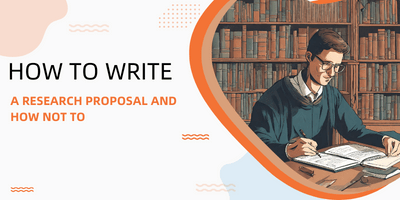Welcome to our guide on how to write a research proposal and how NOT to in 2024. If you’re a student or researcher, understanding the ropes of creating a solid research proposal is crucial.
In this blog, we’ll walk you through the process using easy-to-follow tips. Whether you’re an expert or just starting out, our advice will help you structure your proposal effectively and avoid common mistakes.
A research proposal is a concise document outlining the plan for an academic investigation. It defines the research question, highlights its significance, reviews relevant literature, and details the methodology. The proposal serves as a roadmap, guiding researchers in explaining the purpose and potential impact of their study before conducting the actual research.
We’re here to simplify the steps, explain things clearly, and show you what works and what doesn’t in the year 2024 for PhD synopsis writing services and also for PhD research design consulting services. Ever wondered, How to write a research proposal? Well, you’re in the right place! Join us as we explore the ins and outs of crafting proposals that grab attention and make a lasting impression in the upcoming year.
PhD Proposal Format
The general PhD proposal format is described below:
a) Introduction: Clearly state the proposed research topic and its significance.
b) Background: Provide a brief overview of existing literature relevant to the research.
c) Research Questions: Clearly formulate the questions your research aims to answer.
d) Objectives: Outline specific goals and what you intend to achieve through the research.
e) Methodology: Describe the research methods and tools you plan to use.
f) Significance: Highlight the potential impact and contribution of your research.
g) Timeline: Provide a realistic schedule for completing different phases of the research.
Note: While writing any PhD proposal format, ensure clarity and conciseness, making it easy for readers to grasp the essence of your research.
# How to Write
i) Clearly express your research question and objectives without unnecessary complexity.
ii) Structure your proposal in a clear and straightforward manner, ensuring a logical flow of ideas.
iii) Demonstrate a solid understanding of existing literature relevant to your research.
iv) Emphasize the gap your research aims to address, showcasing its originality and potential contribution.
v) Provide a clear outline of the research methods and tools you plan to employ.
vi) Ensure that your proposed methodology is feasible, taking into account time, resources, and ethical considerations.
vii) Clearly articulate the relevance of your research to the field.
viii) Highlight the potential impact and significance of your proposed study.
ix) Develop a realistic timeline for completing different stages of your research.
x) Ensure that your proposed schedule aligns with the overall scope of your project.
xi) Ensure that every section of your proposal directly contributes to achieving your research objectives.
xii) Avoid including unnecessary information that does not support the core focus of your study.
xiii) Clearly address any ethical considerations associated with your research.
xiv) Demonstrate an understanding of the ethical guidelines relevant to your field of study.
x V) Be open to feedback and willing to revise your proposal based on constructive input.
xvi) Seek guidance from mentors or peers to enhance the quality of your proposal.
xvii) Use straightforward language, avoiding unnecessary jargon or overly complex sentences.
xviii) Ensure that your proposal is accessible to readers with varied levels of expertise in your field.
# How NOT to Write
- Vagueness and Ambiguity:
- Avoid using unclear language or overly complex sentences to write your research that may confuse readers.
- Steer clear of vague research questions or objectives that lack precision.
- Neglecting Literature Review:
- Do not overlook the importance of a thorough literature review; it provides essential context and justifies your research.
- Failing to acknowledge existing research may weaken the significance of your proposal.
- Unrealistic Scope:
- Avoid proposing research with an overly ambitious scope that may be impractical within the given time frame.
- Ensure your research objectives are achievable, considering the available resources and constraints.
- Lack of Relevance:
- Do not lose sight of the relevance of your research to the broader field.
- Ensure that every aspect of your proposal contributes directly to the central focus of your study.
- Inadequate Methodology Description:
- Avoid providing an insufficient or unclear description of your research methods and tools.
- Ensure that the methodology proposed is well-defined and aligns with your research objectives.
- Overlooking Ethical Considerations:
- Do not neglect addressing ethical considerations associated with your research.
- Demonstrate a thorough understanding of the ethical guidelines relevant to your specific field of study.
- Ignoring Feedback:
- Avoid dismissing or ignoring constructive feedback on your proposal.
- Be open to revising and improving your proposal based on valuable input from mentors or peers.
- Excessive Complexity:
- Steer clear of unnecessarily complex language or convoluted explanations.
- Ensure that your proposal is accessible to readers with varying levels of expertise in your field.
- Lack of Clear Timeline:
- Do not overlook the importance of a well-structured timeline for your research.
- Ensure that the proposed schedule aligns with the overall scope and objectives of your project.
# How to Choose PhD Topic Consultation Services
There are several ways to choose PhD topic consultation services which are described below:
i) Make sure the service has expertise in the subject of your study.
ii) Look for positive feedback from previous clients.
iii) Seek services that tailor advice to fit your research proposal.
iv) Evaluate the quality of one-on-one consultations offered.
v) Consider services that align with your budget constraints.
vi) Research the service’s success in aiding others in topic selection.
Final Thoughts
To sum it up, understanding how to write a research proposal is vital, and our guide has shared the key things to do and avoid in 2024. Be clear, review existing literature well, and plan realistic methods for a strong proposal.
Don’t be vague, set achievable goals, and always consider ethics. Stick to a sensible timeline, welcome feedback, and keep your language simple. Your proposal should be clear, relevant, and make a meaningful contribution.
By sidestepping common mistakes, the research proposal can shine and make a positive impact in 2024. Good luck with your proposal writing journey!
PhDthesis.in is a research support service provider that offers a range of services to PhD scholars and academic authors. The company is dedicated to enhancing the value and academic excellence of theses written by PhD scholars.
PhDthesis.in provides research consultation, thesis writing, editing, and statistics services. The company has a team of experienced and talented consultants in all the requisite fields of writing, editing, and statistics. The consultants manage and guide doctoral research students in a collaborative manner and solve all queries promptly.
PhDthesis.in also offers a wide categorization of PhD synopsis writing services and also for PhD research design consulting services, which are segregated into three distinct categories: thesis proposal stage, thesis writing stage, and thesis completion stage.
The company’s interactive mode of mentoring sets it apart from its competitors as it focuses on providing ready-to-use solutions to varied users. PhDthesis.in also provides PhD guidance and support to PhD scholars at all stages of research documentation. The company’s objective is to encourage originality and help PhD students to write their theses after understanding each facet of their research.
FAQs
a) Is a research proposal needed for a PhD application?
Ans. Yes, a research proposal is typically required for a PhD application.
b) What’s the most important part of a PhD research proposal?
Ans. The research question and its significance are crucial in a PhD research proposal.
c) Is a completed PhD proposal referred back for revision?
Ans. A completed PhD proposal may be revised based on feedback.
d) How many pages should a PhD proposal have?
Ans. The length of a PhD proposal varies, but it generally ranges from 10-20 pages.
e) How to write an effective research proposal for a PhD in India?
Ans. To write an effective research proposal for a PhD in India, clearly define the research problem, demonstrate its significance, outline a well-structured methodology, and emphasize the potential contributions to the field. PhDthesis.in can help you in this.
f) What type of scope is expected for a PhD proposal?
Ans. A PhD proposal is expected to have a broad and well-defined scope.
g) What is next after submitting my research proposal?
Ans. After submitting a research proposal, the next step involves a review and potential feedback from the academic committee.

